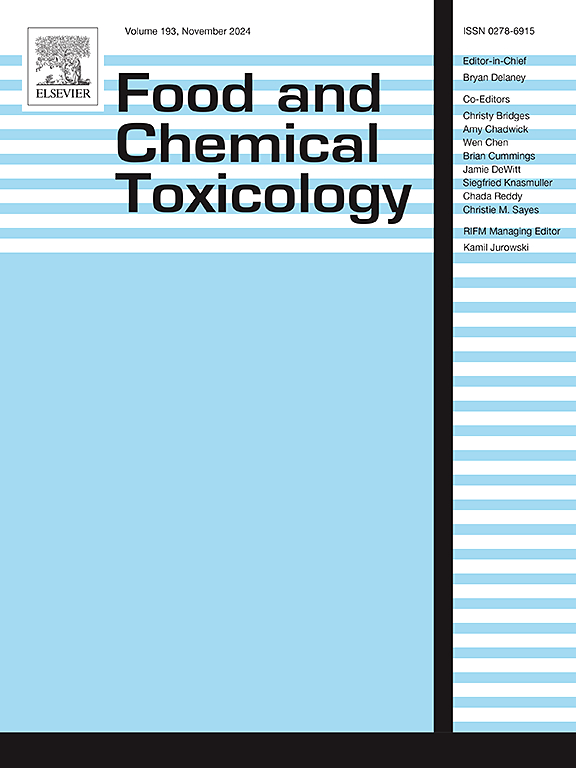研究从饮食和补充剂中摄入的 β-胡萝卜素、吸烟与肺癌风险之间的关系。
IF 3.9
3区 医学
Q2 FOOD SCIENCE & TECHNOLOGY
引用次数: 0
摘要
β-胡萝卜素是一种天然、安全的维生素 A 膳食来源,按一般膳食量摄入可降低患癌风险。然而,有两项临床试验报告称,服用β-胡萝卜素补充剂(20 或 30 毫克/天)的重度吸烟者的肺癌发病率和总死亡率有所上升。基于这些研究结果,粮农组织/世卫组织食品添加剂联合专家委员会撤销了β-胡萝卜素(0-5 毫克/千克体重)的每日允许摄入量。我们评估了相关的流行病学和毒理学文献,以评估这种关系的生物学合理性,并确定了涉及细胞增殖信号转导的三种机制,这是一种促癌作用模式。总体证据一致表明,即使在有烟雾存在的情况下,典型膳食剂量的β-胡萝卜素也会通过这些机制减少细胞增殖信号,而同时暴露于烟雾和更高剂量的补充剂则会通过这些相同的途径增加细胞增殖信号。通过与烟雾成分的反应产生过多的β-胡萝卜素氧化代谢物可能是导致这种关系的关键因素。与之前的研究结果一致,我们的评估表明,对于不吸烟的普通人群来说,每天摄入多达 50 毫克的 β-胡萝卜素不会带来安全问题。每天摄入低于 15 毫克 β-胡萝卜素的重度吸烟者罹患肺癌的风险也不会增加。本文章由计算机程序翻译,如有差异,请以英文原文为准。
Investigating the relationship between β-carotene intake from diet and supplements, smoking, and lung cancer risk
β-carotene is a naturally occurring and safe dietary source of vitamin A that is associated with cancer risk reductions when consumed in typical dietary amounts. However, two clinical trials reported increased incidence of lung cancer and total mortality among heavy smokers taking β-carotene supplements (20 or 30 mg/day). Based on these findings, the Joint FAO/WHO Expert Committee on Food Additives withdrew Acceptable Daily Intake values for β-carotene (0–5 mg/kg bw). We evaluated relevant epidemiological and toxicological literature to assess the biological plausibility of this relationship and identified three mechanisms involving cellular proliferation signaling, a mode of action for cancer promotion. The overall weight of evidence consistently demonstrated typical dietary doses of β-carotene decreased cellular proliferation signaling via these mechanisms, even in the presence of smoke, while co-exposure to smoke and higher, supplemental doses increased cellular proliferation signaling through these same pathways. The production of excessive oxidative β-carotene metabolites via reactions with smoke constituents may be a key event underlying this relationship. Consistent with previous findings, our evaluation indicated consumption of up to 50 mg/day β-carotene does not present safety concerns for the non-smoking general population. Heavy smokers consuming less than 15 mg β-carotene/day are not expected to be at an increased risk of lung cancer.
求助全文
通过发布文献求助,成功后即可免费获取论文全文。
去求助
来源期刊

Food and Chemical Toxicology
工程技术-毒理学
CiteScore
10.90
自引率
4.70%
发文量
651
审稿时长
31 days
期刊介绍:
Food and Chemical Toxicology (FCT), an internationally renowned journal, that publishes original research articles and reviews on toxic effects, in animals and humans, of natural or synthetic chemicals occurring in the human environment with particular emphasis on food, drugs, and chemicals, including agricultural and industrial safety, and consumer product safety. Areas such as safety evaluation of novel foods and ingredients, biotechnologically-derived products, and nanomaterials are included in the scope of the journal. FCT also encourages submission of papers on inter-relationships between nutrition and toxicology and on in vitro techniques, particularly those fostering the 3 Rs.
The principal aim of the journal is to publish high impact, scholarly work and to serve as a multidisciplinary forum for research in toxicology. Papers submitted will be judged on the basis of scientific originality and contribution to the field, quality and subject matter. Studies should address at least one of the following:
-Adverse physiological/biochemical, or pathological changes induced by specific defined substances
-New techniques for assessing potential toxicity, including molecular biology
-Mechanisms underlying toxic phenomena
-Toxicological examinations of specific chemicals or consumer products, both those showing adverse effects and those demonstrating safety, that meet current standards of scientific acceptability.
Authors must clearly and briefly identify what novel toxic effect (s) or toxic mechanism (s) of the chemical are being reported and what their significance is in the abstract. Furthermore, sufficient doses should be included in order to provide information on NOAEL/LOAEL values.
 求助内容:
求助内容: 应助结果提醒方式:
应助结果提醒方式:


